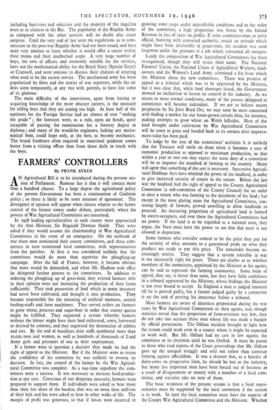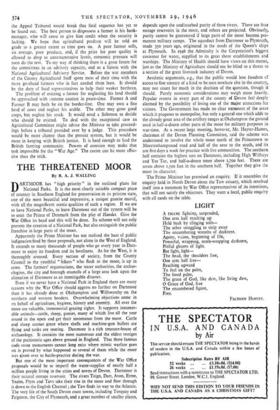FARMERS' CONTROLLERS
By FRANK SYKES
AN Agricultural Bill is to be introduced during the present ses- sion of Parliament. Rumour has it that it will contain more than a hundred clauses. To a large degree the agricultural policy of the present Government has been a continuation of Coalition policy ; so there is likely to be some measure of agreement. The divergence of opinion will appear when clauses relative to the future control of the farmer comes under debate, particularly where the powers of War Agricultural Committees are concerned.
In 1938 leading agriculturalists in each county were approached by the then Minister, Sir Reginald Dorman Smith They were asked if they would assume the chairmanship of War Agricultural Committees in the event of an emergency. On the outbreak of war these men nominated their county committees, and these com- mittees in turn nominated local committees, with representatives from the parishes. At first it was considered unlikely that the committees would do more than supervise the ploughing-up campaign. After the fall of France, however, it became obvious that more would be demanded, and when Mr. Hudson took office he delegated further powers to the committees. In addition to ordering the ploughing up of grass-land, they evicted farmers who in their opinion were not increasing the production of their farms sufficiently. They took possession of land which in many instances had never been cultivated, and brought it into production. They became responsible for the rationing of artificial manures, animal feeding-stuffs and farm machinery. They served orders on farmers to grow wheat, potatoes and sugar-beet in order that county quotas might be fulfilled. They organised a system whereby farmers without the labour might have their land cultivated, sown, harvested or drained by contract, and they organised the destruction of rabbits and rats. By the end of hostilities their staffs numbered more than to,000 men and women, as well as hundreds of thousands of Land Army girls and prisoners of war in their employment.
If a farmer were to question a decision they made he had the right of appeal to the Minister. But if the Minister were to retain the confidence of his committee he was unlikely to reverse its decision. In fact, the control of the farmer by the War Agricul- tural Committee was complete. As a war-time expedient the com- mittees were a success. It was necessary to increase food-produc- tion at any cost. Conscious of our desperate necessity, farmers were prepared to support them. If individuals were asked to bear more than their fair share of the burden, that was no more than millions of their kith and kin were asked to bear in other walks of life. The margin of profit was generous, so that if losses were incurred in growing some crops under unprofitable conditions and to the order of the committee, a high proportion was borne by the Inland Revenue in loss of taxes on profits. If some committee-man or petty official, bursting with unwonted authority, struck an attitude which might have been intolerable in peace-time, the incident was soon forgotten under the pressure of a job which consumed all energies.
Lately the composition of War Agricultural Committees has been re-organised, though they still retain their name. The National Farmers' Union, the National Union of Agricultural Workers, land- owners and the Women's Land Army submitted a list from which the Minister chose the new committees. There was promise of appeal to a tribunal which was to be appointed by the Minister, but it was clear that, while food shortages lasted, the Government showed no inclination to loosen its control of the industry. As we return to more normal conditions, many of the powers delegated to committees will become redundant. If we are to believe recent prophecies by Sir John Boyd Orr, we may soon be more concerned with finding a market for our home-grown cereals than, for instance, making attempts to grow wheat on Welsh hillsides. Most of the land brought under cultivation by War Agricultural Committees will be sown to grass and handed back to its owners after improve- ment-value has been paid.
To judge by the cost of the committees' activities it is unlikely that the Treasury will smile on them when it becomes a case of economic production as opposed to maximum production, so that within a year or two one may expect the main duty of a committee will be to improve the standard of farming in the country. Many will agree that something of the sort is necessary. Successive Agricul- tural Holdings Acts have whittled the power of the landlord, in order to give increased security of tenure to the tenant. Before the last war the landlord had the right of appeal to the County Agricultural Committee (a sub-committee of the County Council) for an order to eject a tenant who was farming to the detriment of his land ; but except in the most glaring cases the Agricultural Committees, con- sisting largely of farmers, proved unwilling to allow landlords to proceed. An increasing proportion of agricultural land is farmed by owner-occupiers, and over these the Agricultural Committees had no power. If the land is to be regarded as a national asset, they argue, the State must have the power to see that that asset is not allowed to depreciate.
Some farmers who consider control to be the price they pay for the security of what amounts to a guaranteed profit on what they produce are ready to pay this price. The remainder become in- creasingly restive. They suggest that a system tolerable in war is not necessarily right for peace. There are doubts as to whether members of the committees, appointed by the Minister as his agents, can be said to represent the farming community. Some form of appeal, they say, is better than none, but they have little confidence in a tribunal appointed by the Minister, whose findings the Minister is not even bound to accept. In England a man is judged innocent till he is proved guilty, but a farmer judged guilty by a committee is set the task of proving his innocence before a tribunal.
Most farmers are aware of injustices perpetrated during the war years by War Agricultural Committees or their agents, and, though statistics reveal that the proportion of farm-evictions was low, they do not take into account those men whose life was made a burden by official persecution. The Odlum incident brought to light how the system could work even in a county where it might be expected to work well. But Mr. Odium had no case in law against the committee or its chairman until he was libelled. It must be patent to those who read reports of the Court proceedings that Mr. Odium gave up the unequal struggle and sold out rather than continue farming against officialdom. It was a disaster that, as a breeder of dairy-cows on progressive lines, he should be lost to the industry, but many less important men have been forced out of business as a result of disagreement or enmity with a member of a local com- mittee, and statistics take no note of them.
The basic weakness of the present system is that a local repre- sentative must be supported by the local committee if the system is to work. In turn the local committee must have the support of the County War Agricultural Committee and the Minister. Whether the Appeal Tribunal would break that fatal sequence has yet to be found out. The best person to dispossess a farmer is his bank- manager, who will cease to give him credit when the security is lacking. We hope that agricultural produce will be sold on grade to a greater extent as time goes on. A poor farmer sells, on average, poor produce, and, if the price for poor quality is allowed to drop to unremunerative levels, economic pressure will soon do the rest. To my way of thinking there is a great future for the committees in an advisory capacity, and as a liaison with the National Agricultural Advisory Service. Before the war members of the County Agricultural Staff spent most of their time with the more go-ahead farmers who in fact needed them least. It should be the duty of local representatives to help their weaker brethren.
The problem of evicting a farmer for neglecting his land should be approached with c xtreme caution in peace-time. Farmer A and Farmer B may both be on the border-line. One may own a fine herd of cows and neglect his arable. The other may grow good crops, but neglect his stock. It would need a Solomon to decide who should be evicted. To deal with the exceptional case an Agricultural Committee might advise the Minister to take proceed- ings before a tribunal presided over by a judge. This procedure would be more clumsy than the present system, but it would be more in keeping with British justice. It is hard enough to lead the British farming community. Powers of coercion may make that task impossible for the " War Age." The carrot can be more effec- tive than the stick.



































 Previous page
Previous page